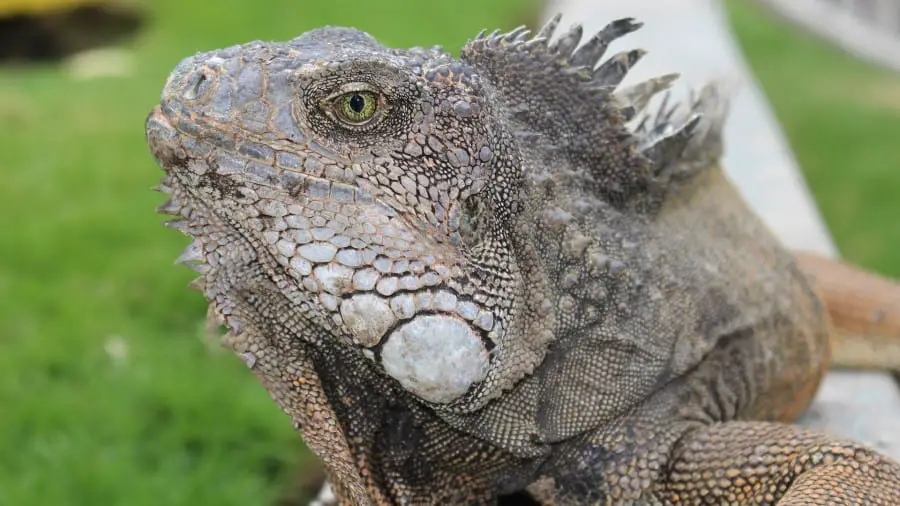
Oranges are full of essential vitamins but can iguanas eat them? Before you feed anything to your iguana, you should make sure they are safe for iguanas’ consumption.
These reptiles have a digestive system that is very different from humans. There are many things that humans can eat but iguanas can’t. After caring for my own pet iguana for years and having done lots of research, here is what I’ve gathered.
Iguanas can’t eat oranges. Their stomach can’t properly digest highly acidic food.
Without knowing what you can and cannot feed your iguana, you will be jeopardizing its health. Feeding a high amount of acidic food to iguanas will not end well.
Reasons Why Iguanas Can’t Eat Oranges
Oranges are full of nutrients and are delicious at the same time, but it’s just not suitable for iguanas to consume. Here are the reasons for it:
Oxalic Acid
Oranges are high in oxalic acid which can hinder the absorption of calcium in iguanas. Metabolic bone disease (MBD) is one of the most common issues in iguanas which is often caused by consuming too much oxalic acid.
With MBD, iguanas can develop soft bones, deformation in limbs, and paralysis. This can potentially be fatal. However, don’t be afraid to feed foods with some oxalic acid to iguanas.
As long as it’s of a small amount and your iguana is taking calcium powder as a supplement followed by a healthy, balanced diet, there should be no problem. That being said, there is just way too much oxalic acid in oranges for iguanas to eat safely.
High Level of Acidity
Orange being a citrus fruit is high in acidity. This high level of acidity can irritate iguanas’ digestive tracts which can cause diarrhea.
High Sugar Level
The amount of sugar present in oranges is of a pretty high level. Generally, iguanas should not be eating a lot of fruits because of this reason.
Iguanas can’t digest sugar well and on top of that, it can also cause obesity, diabetes, fatty liver disease, or even heart failure.
What Happens When Iguanas Eat Oranges?
Oranges when fed in an extremely small amount are alright for iguanas. I’m talking about 1 to 2 pieces of orange a month. Feeding anything more than that could cause some serious issues in your iguana’s digestive system.
It can lead to diarrhea and if that doesn’t stop, your iguana will eventually be dehydrated. Iguanas already have a “dry” system, most of them can’t afford to lose much water, hence diarrhea can be very dangerous.
Dehydration in iguanas can hinder shedding and blood circulation which can potentially make them lose their toes or tails. On a more serious note, dehydration can also lead to failure in the kidneys, heart, and even death.
Will Iguanas Eat Oranges?
If you were to feed oranges to iguanas, they will happily eat it. These are very curious animals and will sell their soul for food. If you have any experience of owning an iguana, you know they have a very big appetite.
They are willing to try something new if they get a chance even if it’s not what they normally eat. Usually, iguanas have a staple diet of mostly green leafy vegetables and some fruits occasionally.
So, don’t present any food that you know your iguana shouldn’t eat because they will eat it without hesitation.
Can Iguanas Eat Mandarin Oranges?
Mandarin oranges are generally less acidic than regular ones. Because of this, some people might think that it’s acceptable to feed to iguanas but they are mistaken. Unfortunately, the level of acidity in mandarin oranges is still way too high for iguanas to consume and digest properly.
Mandarin oranges have much higher sugar content which makes a very delicious yet healthy snack for humans but not so great for iguanas. For the exact reasons, clementines should be avoided as well.
Are Oranges Any Good for Iguanas At All?
Ignoring the fact that oranges are acidic, high in sugar, and oxalic acid, they are actually a pretty decent food for iguanas. Oranges are high in Vitamin C and calcium which are both great for iguanas wellbeing.
Most iguanas don’t eat enough calcium that is why most iguana owners supplement their iguana’s meal with calcium powder.
Calcium is important to iguanas for 2 reasons. The first is for the development of strong bones and the other is to lay healthy eggs.
It is a shame that orange is both acidic and high in sugar which cannot be digested well in iguanas, not to mention the oxalic acid that oranges contain.
If we can strip away these three attributes, oranges are actually fantastic food for iguanas because of the vitamins and calcium it contains.
How About Orange Peels?
Orange peels are high in oxalic acid and orange oil which are both bad for iguanas.
Even though orange peels are also high in calcium which is good for iguanas, oxalic acid and orange oil outweigh the benefits. On top of that, the texture can make it quite hard for iguanas to consume.
Conclusion
You should never feed oranges to iguanas because they are too high in oxalic acid, acidity, and sugar content. All of which are not good for iguanas.
When iguanas eat oranges too often, it can lead to diarrhea and then dehydration. Make sure not to put any food near your iguana that it is not supposed to eat because iguanas will try out new food without hesitation.
There are no oranges that are the exception and that includes mandarin oranges and clementines even if they are slightly less acidic. Oranges have some essential nutrients that are pretty good for iguanas such as Vitamin C and calcium but the risks simply outweigh them.
Lastly, orange peels should also be avoided as they are high in oxalic acid and orange oil, both of which aren’t ideal to have in iguanas’ diet.


